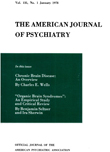WITHDRAWAL SYMPTOMS AFTER ABRUPT CESSATION OF ANTIPSYCHOTIC COMPOUNDS: CLINICAL CONFIRMATION IN CHRONIC SCHIZOPHRENICS
Abstract
Two separate double-blind studies comparing the incidence of withdrawal emesis after the abrupt cessation of medication, one using an inert placebo and the second using phenobarbital as control agents, revealed highly significant differences between the antipsychotic compounds (phenothiazine and butyrophenone derivatives) and the control groups (placebo and phenobarbital). Thorough medical evaluation, including gastric analyses, ruled out gastritis as an etiology of the gastrointestinal withdrawal symptom. It would thus appear that abrupt termination of these antipsychotic medications in chronic schizophrenics does produce gastrointestinal withdrawal symptoms of CNS origin in a significant number of treated subjects.
Access content
To read the fulltext, please use one of the options below to sign in or purchase access.- Personal login
- Institutional Login
- Sign in via OpenAthens
- Register for access
-
Please login/register if you wish to pair your device and check access availability.
Not a subscriber?
PsychiatryOnline subscription options offer access to the DSM-5 library, books, journals, CME, and patient resources. This all-in-one virtual library provides psychiatrists and mental health professionals with key resources for diagnosis, treatment, research, and professional development.
Need more help? PsychiatryOnline Customer Service may be reached by emailing [email protected] or by calling 800-368-5777 (in the U.S.) or 703-907-7322 (outside the U.S.).



